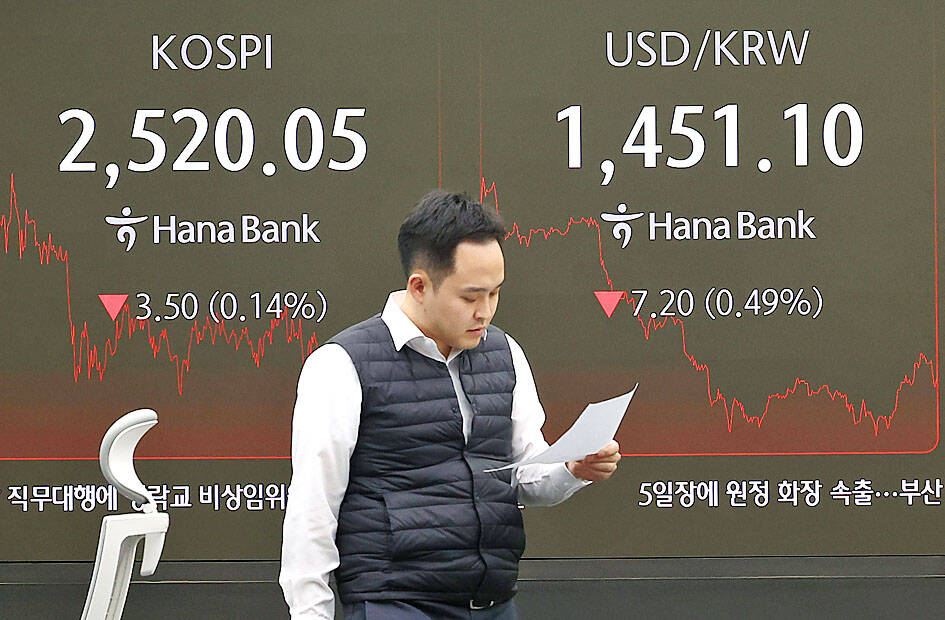South Korea’s central bank yesterday slashed its growth forecast for this year because of the political crisis triggered by South Korean President Yoon Suk-yeol’s declaration of martial law last month.
The move came as the government unveiled a US$250 billion support package for exporters amid worries of possible tariffs by US President Donald Trump as he returns to the White House.
“The unexpected declaration of martial law in early December, coupled with the ongoing political turmoil and the Jeju Air passenger plane disaster, significantly dampened economic sentiment,” the Bank of Korea said in a statement.

Photo: EPA-EFE
The political turmoil and plane crash “led to contractions in domestic consumption and construction investment, likely causing the fourth-quarter growth rate to fall well below the November projection,” the statement said. “Consumption, which had shown improvement in the third quarter, appeared to weaken again in the fourth quarter.”
As a result, the bank’s Monetary Policy Committee revised down its estimate for the final quarter of last year, from 2.2 percent to a range of 2.0 to 2.1 percent.
It had projected 1.9 percent growth for this year, but “the forecast has been revised downward to 1.6 to 1.7 percent,” it said.
Hours after the central bank slashed its growth forecasts, the South Korean Ministry of Finance announced a huge exporter support package in preparation for possible tariffs by Trump.
The ministry said it was allocating massive new support for the nation’s exporters, including technology giant Samsung Electronics Co and semiconductor leader SK Hynix Inc, owing to growing risks overseas.
“External uncertainties, such as the inauguration of the new US administration, pose concerns about potential adverse effects on the export front for businesses,” ministry Support Division Deputy Director Kim Dong-joon said.
In response, “the government plans to provide export financing on an unprecedented scale of 360 trillion won [US$248.1 billion] this year,” the ministry said in a statement.
In part due to the protracted political chaos, the won has fallen to record lows against the US dollar.
The ministry said that to mitigate the foreign exchange rate volatility, it would boost the budget for exchange rate fluctuation insurance.
The package includes allowing the Export-Import Bank of Korea to provide 50 trillion won over the next five years to industries such as semiconductors and batteries, “which have recently faced challenges,” the statement said.
Kim said that the government would try “to develop financial support measures to help promising industries — such as defense, nuclear energy and shipbuilding — leverage US-Korea cooperation to expand export and contract achievements.”
The benchmark KOSPI fell 0.14 percent to close at 2,520.05 after the central bank cut its growth forecasts, while the won was trading at 1,451.7 per US dollar at 3:30pm, down 6.6 won from the previous session.

Anna Bhobho, a 31-year-old housewife from rural Zimbabwe, was once a silent observer in her home, excluded from financial and family decisionmaking in the deeply patriarchal society. Today, she is a driver of change in her village, thanks to an electric tricycle she owns. In many parts of rural sub-Saharan Africa, women have long been excluded from mainstream economic activities such as operating public transportation. However, three-wheelers powered by green energy are reversing that trend, offering financial opportunities and a newfound sense of importance. “My husband now looks up to me to take care of a large chunk of expenses,

SECTOR LEADER: TSMC can increase capacity by as much as 20 percent or more in the advanced node part of the foundry market by 2030, an analyst said Taiwan Semiconductor Manufacturing Co (TSMC, 台積電) is expected to lead its peers in the advanced 2-nanometer process technology, despite competition from Samsung Electronics Co and Intel Corp, TrendForce Corp analyst Joanne Chiao (喬安) said. TSMC’s sophisticated products and its large production scale are expected to allow the company to continue dominating the global 2-nanometer process market this year, Chiao said. The world’s largest contract chipmaker is scheduled to begin mass production of chips made on the 2-nanometer process in its Hsinchu fab in the second half of this year. It would also hold a ceremony on Monday next week to

TECH CLUSTER: The US company’s new office is in the Shalun Smart Green Energy Science City, a new AI industry base and cybersecurity hub in southern Taiwan US chip designer Advanced Micro Devices Inc (AMD) yesterday launched an office in Tainan’s Gueiren District (歸仁), marking a significant milestone in the development of southern Taiwan’s artificial intelligence (AI) industry, the Tainan City Government said in a statement. AMD Taiwan general manager Vincent Chern (陳民皓) presided over the opening ceremony for the company’s new office at the Shalun Smart Green Energy Science City (沙崙智慧綠能科學城), a new AI industry base and cybersecurity hub in southern Taiwan. Facilities in the new office include an information processing center, and a research and development (R&D) center, the Tainan Economic Development Bureau said. The Ministry

ADVERSARIES: The new list includes 11 entities in China and one in Taiwan, which is a local branch of Chinese cloud computing firm Inspur Group The US added dozens of entities to a trade blacklist on Tuesday, the US Department of Commerce said, in part to disrupt Beijing’s artificial intelligence (AI) and advanced computing capabilities. The action affects 80 entities from countries including China, the United Arab Emirates and Iran, with the commerce department citing their “activities contrary to US national security and foreign policy.” Those added to the “entity list” are restricted from obtaining US items and technologies without government authorization. “We will not allow adversaries to exploit American technology to bolster their own militaries and threaten American lives,” US Secretary of Commerce Howard Lutnick said. The entities